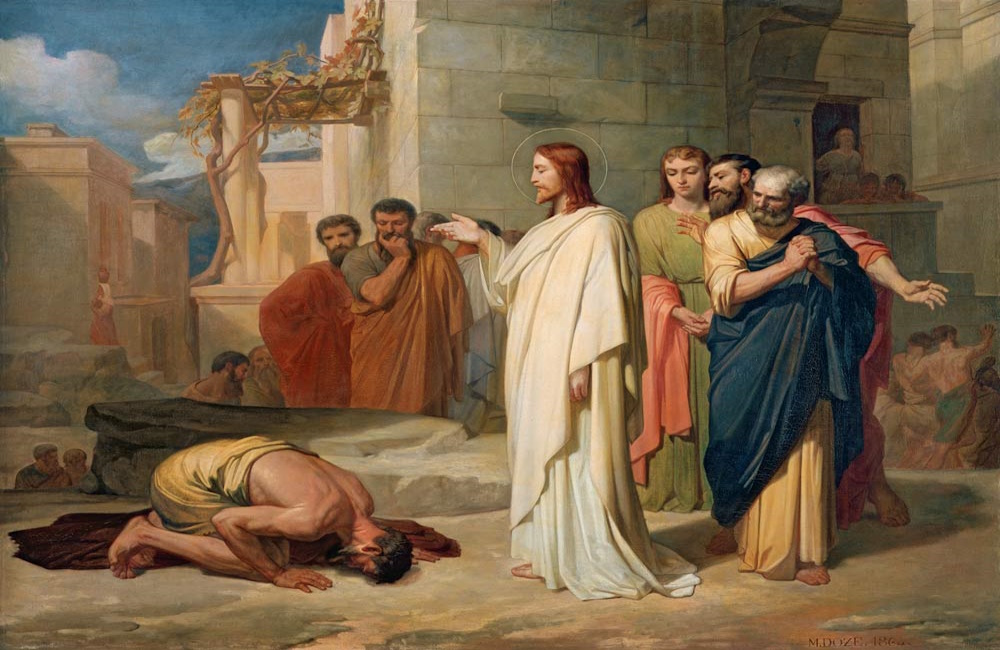Jesus and Worship: Respecting Human Freedom and Choice
This question is cleverly constructed, blending two distinct inquiries. First, it’s important to note that Jesus never explicitly commanded people to worship Him. He left that decision to individual choice, respecting human freedom. However, throughout the Bible, there are numerous instances where people worshiped Him, and He did not rebuke them. Instead, He accepted their worship, acknowledging His divine nature.
Jesus, in His humility, taught people to worship God the Father, yet He never refused the worship directed toward Him, because He was God. This contrasts with other figures in the Bible, such as prophets or angels, who consistently refused worship when it was offered to them. Jesus stood apart as the only one who did not reject worship.
The second part of the question asks where in the Bible Jesus explicitly claimed to be God. While He might not have used those exact words, Jesus made many statements that clearly indicated His divine identity. Could you provide some examples to illustrate this?
Where Does the Bible Indicate Jesus’ Divine Identity?
While Jesus never explicitly said the words “I am God” in the Bible, He made several statements and performed actions that clearly indicate His divine identity. Here are a few notable examples:
John 10:30 – Jesus says, “I and the Father are one.” This statement implies a unity with God that transcends ordinary human relationships.
John 8:58 – Jesus declares, “Before Abraham was born, I am!” By using the phrase “I am,” Jesus echoes the divine name God used in Exodus 3:14, suggesting His eternal existence and divinity. This claim led His listeners to accuse Him of blasphemy.
John 14:9 – Jesus tells Philip, “Anyone who has seen me has seen the Father.” This indicates that Jesus is the visible representation of God.
Revelation 1:17-18 – Jesus says, “I am the First and the Last. I am the Living One; I was dead, and now look, I am alive for ever and ever!” The title “First and Last” is used for God in the Old Testament (Isaiah 44:6), and Jesus applying it to Himself indicates His divine nature.
Additionally, in Matthew 16:15-17, Jesus asks His disciples, “But what about you? Who do you say I am?” Simon Peter replies, “You are the Messiah, the Son of the living God.” Jesus responds, “Blessed are you, Simon son of Jonah, for this was not revealed to you by flesh and blood, but by my Father in heaven.” This exchange highlights Peter’s recognition of Jesus’ divine sonship, which Jesus affirms.
Divine Authority in Forgiveness of Sins
In exploring the divine nature of Jesus, a significant episode from the Gospel of Mark provides profound insights. In Mark 2:5-7, Jesus encounters a paralyzed man and says, “Son, your sins are forgiven.” This declaration triggers a strong reaction from the teachers of the law, who think to themselves, “Why does this fellow talk like that? He’s blaspheming! Who can forgive sins but God alone?” Their reaction underscores the deep-seated belief that only God has the authority to forgive sins, thereby highlighting the gravity of Jesus’ claim to divine authority.
This understanding of divine forgiveness is mirrored in Islamic teachings. The Qur’an emphasizes that only Allah can forgive sins. In Surah Al-Zumar, verse 53, Allah states, “Say, ‘O My servants who have harmed yourselves by your own selves, do not despair of the mercy of Allah. Indeed, Allah forgives all sins. Indeed, it is He who is the Forgiving, the Merciful.'” This verse underscores that Allah alone has the power to forgive sins, reinforcing the Islamic belief that such an act is exclusively divine.
The parallel between these teachings underscores a profound theological point: in Christianity, Jesus’ ability to forgive sins is seen as a clear indication of His divine nature. By claiming the authority to forgive sins—a prerogative traditionally reserved for God—Jesus asserts His identity as divine. This act of forgiveness, which provoked accusations of blasphemy from the teachers of the law, is a pivotal element in Christian theology that affirms Jesus’ divine status. In both Christianity and Islam, the authority to forgive sins is a sacred attribute of the divine, but for Christians, it distinctly marks Jesus as God incarnate.
Conclusion
These passages collectively point to Jesus’ divine identity, even though He may not have used the exact phrase “I am God.” Instead, His statements and actions consistently imply His divine nature, suggesting a profound unity with God the Father and affirming His unique role as the Son of God. The recognition and acceptance of worship by Jesus, His claims of eternal existence, His authority to forgive sins, and His self-identification with titles used for God in the Old Testament all contribute to a clear understanding of His divine status. Through these elements, the Bible presents a picture of Jesus that aligns with the belief in His divinity, even if He did not explicitly state “I am God” in those precise words.
